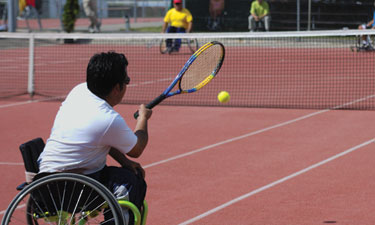 Park and recreation departments can have a major impact on the health and quality of life for citizens with disabilities; however, there is often worry about the cost benefit and required expertise associated with such services.
Park and recreation departments can have a major impact on the health and quality of life for citizens with disabilities; however, there is often worry about the cost benefit and required expertise associated with such services.
The Cost to Society
Public health reports consistently show dramatic increases in the costs associated with healthcare expenses related to individuals with disabilities. Individuals with disabilities often incur double the medical expenses of able-bodied people, with a majority of the cost supported by the public sector. In the future, studies anticipate more major cost spikes due to an aging population and increased diagnoses of autism. With current spending levels on disability-related healthcare measured at more than $400 billion and rising, the spending is becoming a major social issue.1
During the past decade, studies have recommended increased access to healthy lifestyle choices as a top solution for reducing possible future healthcare expenditures, while improving the lives of individuals with disabilities. Unfortunately, according to a recent article by the Centers for Disease Control (CDC) on physical activity for individuals with disabilities, the reality is that 50 percent of adults with disabilities get no aerobic physical activity.2 As park and recreation professionals, we know all about the benefits of physical activity and that there is no difference in the benefit of an active lifestyle for individuals living with a permanent disability versus those who are not.
How Can Park and Recreation Agencies Make a Difference?
In 2007, just after I started working for Salt Lake County Parks and Recreation (SLCPR) in Salt Lake City, Utah, the director asked me to develop a more aggressive approach to marketing and promoting healthy lifestyles for individuals with disabilities. The initial product developed was a fitness pass named the Plus One Pass. The pass enables the member with a disability to bring an assistant with them at no charge when accompanied by the pass holder. The pass was priced at a reduced rate equivalent to our senior rates. The eligibility criteria was modeled after the U.S. Forest Service access pass3 and offers the benefits of going to multiple centers without the requirement of proving one’s disability at each location. Since the pass was introduced, it has been very successful, resulting in SLCPR’s adaptive department needing to conduct a close examination of the programs, equipment and services offered to the Plus One Pass members.
New Disability-Specific Certifications
In the past, SLCPR and many organizations like it relied on mentor/mentee programs provided by seasoned adaptive professionals, recreation therapists, exercise sports science practitioners or adaptive P.E. professionals. We discovered with the increased need for programs aimed at people with disabilities, we needed to hire more specialized staff. The challenging path to becoming a proficient instructor in the wide variety of programs park and recreation departments offer makes it extremely difficult to initiate programming in rural areas or states like Utah that have limited history in providing such services and few personnel with the necessary skills. While searching for solutions, I have noticed there are many new resources and certifications being developed to ensure programmers can attain the basic knowledge to provide safe and healthy sport, fitness and healthy lifestyle opportunities for individuals with disabilities. One of the most exciting new publications to assist programmers is U.S. Paralympics’ “Sport Coaching Guide.”4
My biggest fear has been that instead of creating opportunities for individuals to achieve their goals, I or my staff may unintentionally cause harm to a participant. Safely facilitating a fitness class for disabled people can be complicated due to the diversity of physical challenges that may be associated with a particular disability. SLCPR employs several certified instructors to work with the able-bodied population, so I was pleased to discover the certification opportunities developed by the American College of Sports Medicine and National Center on Health, Physical Activity and Disability, including the Certified Inclusive Fitness Instructor program.5
Improving Quality of Life
Hopefully, learning more about available certification and fitness training opportunities aimed at individuals with disabilities will inspire your agency to do its part to encourage visitors of all ability levels to engage in more physical activity. Park and recreation departments are a critical part of encouraging healthy lifestyle choices for all members of the community.
In the past, it seemed the most common obstacles to access for individuals with disabilities involved architectural concerns, such as whether someone could easily enter a facility’s buildings or traverse its open spaces. Now the focus is on how to create purposeful, quality services, equivalent variety of opportunities and program-specific trained staff to welcome individuals with disabilities. I am consistently on the lookout for new resources and certifications — they will continue to help evolve our programming for individuals with disabilities. Even playgrounds are being programmed by organizations like Shane’s Inspiration — the information is accessible online for free6, so program away!
Jeff Burley, M.S., CTRS, is the Adaptive Recreation Program Manager at Salt Lake County Parks and Recreation.
References
1) http://www.cdc.gov/vitalsigns/pdf/2014-05-vitalsigns.pdf
2) http://www.ncbi.nlm.nih.gov/pmc/articles/PMC2789815/
3) http://www.fs.fed.us/passespermits/access.shtml
4) http://www.teamusa.org/US-Paralympics/Sports/Coaching-guide
5) http://certification.acsm.org/acsm-inclusive-fitness-trainer
6) http://www.shanesinspiration.org/education-inclusion-lunch-box/

